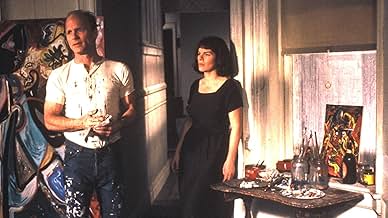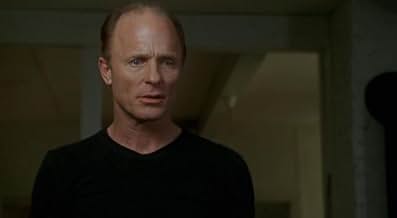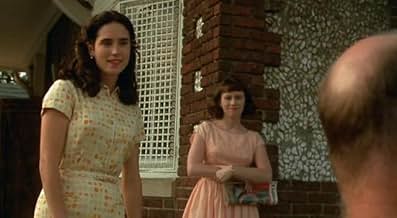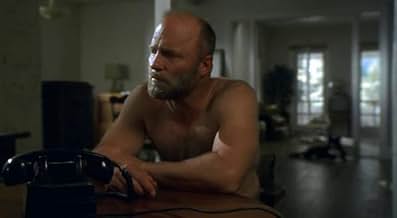VALUTAZIONE IMDb
7,0/10
30.036
LA TUA VALUTAZIONE
La vita e la carriera del pittore americano Jackson Pollock.La vita e la carriera del pittore americano Jackson Pollock.La vita e la carriera del pittore americano Jackson Pollock.
- Vincitore di 1 Oscar
- 3 vittorie e 10 candidature totali
Eulala Scheel
- Arloie's Baby
- (as Eulala Grace Harden)
Trama
Lo sapevi?
- QuizEd Harris's father, Bob L. Harris, bought his son a book about Jackson Pollock simply because he felt Ed bore a strong resemblance to the painter. Ever since then, Ed Harris became fascinated with Pollock's life.
- BlooperWhen the photographer is making the movie of Pollock, he "zooms" in on the shoes. But the old 16 mm camera he is using has a turret with three fixed lenses; thus, he should not be able to zoom. All his other shots are as expected from fixed lenses of different focal lengths.
- Citazioni
Jackson Pollock: If people would just look at the paintings, I don't think they would have any trouble enjoying them. It's like looking at a bed of flowers, you don't tear your hair out over what it means.
- Colonne sonoreThe Mighty Blues
Improvisation
Performed by The Port of Harlem Jazzmen
Courtesy of Blue Note Records
By Arrangement with EMI Capitol Music Special Markets
Recensione in evidenza
Films like "Pollock" always leave me at a loss when I have to describe them to others. For one thing, it's long been a labor of love for director / star Ed Harris, which maybe causes me to have more sympathy for the picture than I should -- after all, I'd hate to ream a project that he's spent so much time and energy developing. For another thing, I usually find biopics a bit crippled because, in most cases ("Pollock" included), I already know the plot, and without the plot to get lost in, I'm left to look at little things like, you know, the acting, writing and directing. Lucky for Harris (and my conscience), then, that the acting is uniformly great, the direction is mostly seamless (and downright kinetic at times), and the writing, while not being great in the "Casablanca" sense of the word, serves the story well. "Pollock" dodges all the pitfalls that often turn biopics into boring history lessons.
The film picks up with Jackson Pollock the Unsuccessful Drunk (Harris), dabbling in surrealist painting and proclaiming Picasso to be a fraud. There's enough promise in his work, though, for him to gain a girlfriend, Lee Krasner (Marcia Gay Harden); a benefactor, Peggy Guggenheim (Amy Madigan); and a professional critic, Clement Greenberg (Jeffrey Tambor), who champions his work in print. From there we watch Pollock take the express train to art world superstardom, becoming one of the world's foremost abstract painters.
The fly in the ointment, though, is Pollock's notorious temper, aided and abetted by his equally notorious alcoholism. Life in New York City is doing his personal life no favors, so he and Krasner move to the countryside, and it's here that he stumbles upon his "drip method" of painting, granting him another wave of fame and recognition. It is this sequence, in which Pollock makes his pivotal discovery, where Harris's talent as a director comes to the fore. Although we're aware that we're watching an actor perform a discovery that was made by someone else more than fifty years ago, it's an exciting, dynamic moment as Harris dances around his canvas, flicking paint from his brush in a blur of motion. It doesn't come off as staged or phony, but as a moment of genuine discovery, and for those moments we might as well actually be watching Jackson Pollock revolutionize the art world.
From there, though, ego, alcohol, and the mechanics of change all prove to be Pollock's undoing, leading, of course, to his untimely demise. Through it all, Harris seethes with a feral intensity, giving a performance that should rightfully win him an Oscar (and check out the dramatic weight gain at the end. Tom who?). Harden, his co-nominee, is also excellent (although she's stuck uttering lines like, "You've done it, Pollock. You've cracked it wide open."). In lesser hands, Krasner could be just another version of the screeching, wailing, put-upon wife, but Harden bolsters the anguish with a fine layer of anger; the torment of a woman who loves the person causing her misery, but who is unwilling to let go of the principles which led her to enter and maintain the relationship on her own terms.
"Pollock" ultimately succeeds because we know how it will end, we clearly see how unpleasant and deluded the artist had become, and still we can't look away. Harris's labor of love serves as an auspicious debut for someone who, at this stage, seems just as skilled behind the camera as he is in front of it.
The film picks up with Jackson Pollock the Unsuccessful Drunk (Harris), dabbling in surrealist painting and proclaiming Picasso to be a fraud. There's enough promise in his work, though, for him to gain a girlfriend, Lee Krasner (Marcia Gay Harden); a benefactor, Peggy Guggenheim (Amy Madigan); and a professional critic, Clement Greenberg (Jeffrey Tambor), who champions his work in print. From there we watch Pollock take the express train to art world superstardom, becoming one of the world's foremost abstract painters.
The fly in the ointment, though, is Pollock's notorious temper, aided and abetted by his equally notorious alcoholism. Life in New York City is doing his personal life no favors, so he and Krasner move to the countryside, and it's here that he stumbles upon his "drip method" of painting, granting him another wave of fame and recognition. It is this sequence, in which Pollock makes his pivotal discovery, where Harris's talent as a director comes to the fore. Although we're aware that we're watching an actor perform a discovery that was made by someone else more than fifty years ago, it's an exciting, dynamic moment as Harris dances around his canvas, flicking paint from his brush in a blur of motion. It doesn't come off as staged or phony, but as a moment of genuine discovery, and for those moments we might as well actually be watching Jackson Pollock revolutionize the art world.
From there, though, ego, alcohol, and the mechanics of change all prove to be Pollock's undoing, leading, of course, to his untimely demise. Through it all, Harris seethes with a feral intensity, giving a performance that should rightfully win him an Oscar (and check out the dramatic weight gain at the end. Tom who?). Harden, his co-nominee, is also excellent (although she's stuck uttering lines like, "You've done it, Pollock. You've cracked it wide open."). In lesser hands, Krasner could be just another version of the screeching, wailing, put-upon wife, but Harden bolsters the anguish with a fine layer of anger; the torment of a woman who loves the person causing her misery, but who is unwilling to let go of the principles which led her to enter and maintain the relationship on her own terms.
"Pollock" ultimately succeeds because we know how it will end, we clearly see how unpleasant and deluded the artist had become, and still we can't look away. Harris's labor of love serves as an auspicious debut for someone who, at this stage, seems just as skilled behind the camera as he is in front of it.
- Alvy_Singer73
- 14 mar 2001
- Permalink
I più visti
Accedi per valutare e creare un elenco di titoli salvati per ottenere consigli personalizzati
- How long is Pollock?Powered by Alexa
Dettagli
Botteghino
- Budget
- 6.000.000 USD (previsto)
- Lordo Stati Uniti e Canada
- 8.598.593 USD
- Fine settimana di apertura Stati Uniti e Canada
- 44.244 USD
- 17 dic 2000
- Lordo in tutto il mondo
- 10.994.533 USD
- Tempo di esecuzione2 ore 2 minuti
- Colore
- Mix di suoni
- Proporzioni
- 1.85 : 1
Contribuisci a questa pagina
Suggerisci una modifica o aggiungi i contenuti mancanti

































